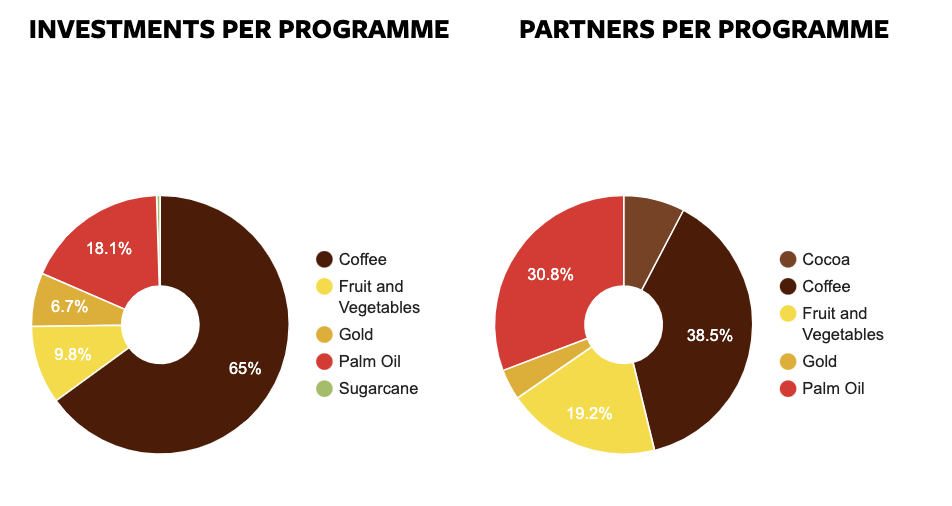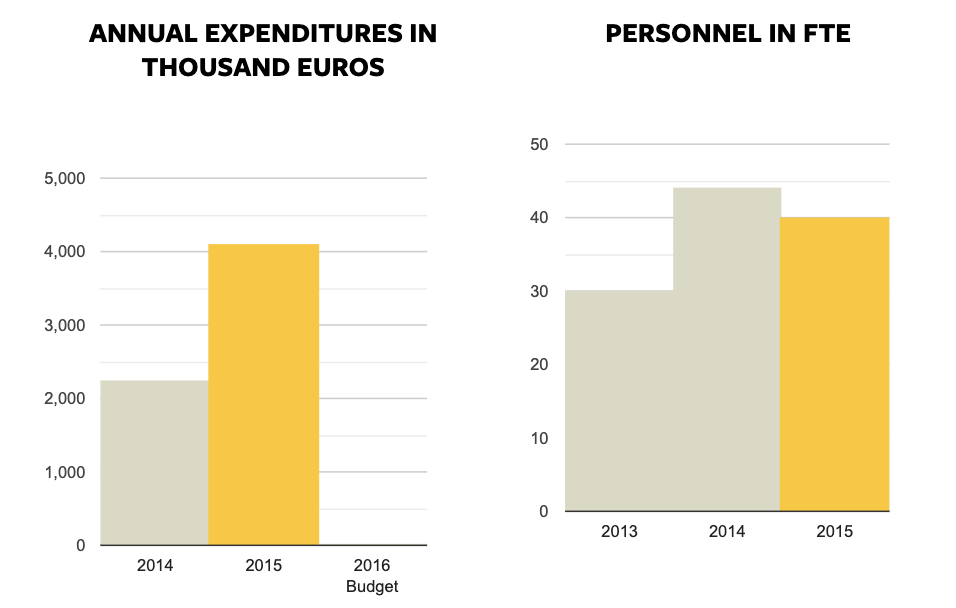REGIONAL COMMODITY PROGRAMMES
After years of developing sector alliances, advising key coffee producing companies and sharing technical expertise, the Sustainable Trade Platform (STP) has contributed to the country becoming the global leader for sustainable coffee production (certified/verified volumes 57% vs. 40% global average).

The banana sector platform supported by Solidaridad is bringing workable solutions to the widespread problem of plastic contamination in the Chira valley. This is necessary due to the absence of a suitable system for the disposal of the millions of plastic bags used to protect the banana bunches. A private initiative is now recycling 20% of the plastic waste. Its ambition is to recycle 50% of all plastics used in the banana region by next year.

Solidaridad seeks to reinforce new policy development in Colombia, and to capitalize on a growing interest in Bolivia for the formalization process. That’s why Solidaridad has created a knowledge platform for learning and sharing research design and results about solutions to issues relating to Latin American artisanal and small-scale mining. These solutions will be tailored to each country’s legal status and progress.

A few years ago, the region’s palm oil sector started to become aware of the importance of RSPO certification. Today, farmers know they have to obtain the certification to be competitive. Private organizations understand that having sustainability credentials will enable them to remain in the market and, due to this acknowledgement, they have become the perfect channel to influence producers who now apply good agricultural practices.

DEVELOPMENTS
The international coffee price hit one of its lowest levels in 2015 after an upturn the year before. Together with the incidents of the yellow rust disease, this caused lower quality and a reduction of 22% in coffee revenue in Peru. In addition, the sector was not able to set aside 16% of the 2015 harvest, which was expected to sell in 2016. This situation seriously affected about 200,000 producers in terms of weakened livelihoods, impoverishment, out migration, increased deforestation (and hence increased GHG emissions) and debilitated producer organizations.
In contrast, 2015 was a record year for Colombian coffee production, reaching 14 million bags as a result of the national renovation programme of rust resistant varieties. El Niño greatly affected coffee production in the second half of 2015, impacting quality and enabling the proliferation of diseases. Forecasts suggest that El Niño is likely to continue affecting volumes and quality during 2016. The gap between certified coffee produced and sold continues to be significant; 2.3 sustainably sold bags for every 7 bags produced.
In this context, Solidaridad has strengthened its work on climate smart and deforestation-free coffee in order to reinforce coffee resilience against climate change and contribute to reduced deforestation.
The impact of climate is also severe in the banana region of Magdalena, Colombia, which has been suffering from drought for about three years. The TR4 disease is also a menace for export bananas worldwide. Solidaridad is facilitating the design of workable options to address water scarcity as well as preventive measures against the TR4 disease.

ACHIEVEMENTS
In Colombia and Peru, around 3,483 coffee smallholders covering 6,075 hectares are currently implementing successful climate smart agricultural practices. About $13.8 million have been invested in sustainable coffee projects through public-private alliances (this includes $3.8 million invested by IDH).
Three company members of the Palm Oil Sustainable Trade Platform achieved the RSPO certification in 2015, which incorporated 14,207 certified hectares and 59,952 tonnes of crude palm oil in Colombia. About 1,088 producers are now implementing good agricultural practices and 3,581 workers are benefitting from better working conditions. In Ecuador, our partner managed to support the RSPO certification for the first group of smallholder producers in the country.
In agreement with the Fyffes company and Fundauniban, Solidariddad secured €800,000 to work on good agricultural practices in 260 smallholder plantain and banana farms in Uraba and Magdalena, Colombia. This project is co-financed by IDH/SIFAV. The banana sector started implementation of biosecurity protocols in 330 farms in order to avoid introducing the Panama TR4 disease in Colombia.
In a pioneering approach, the local sustainable banana platform in Peru managed to support the operation of a small private plant for the recycling and processing of discarded plastic bags used to protect the banana bunches. It recycled 20% of discarded plastic bags in 2015, and is anticipated to recycle about 50% of total discarded plastics in 2016 in northern Peru.
One more small-scale gold mine, MACDESA, was FLO Fairtrade certified in 2015 with support from Solidaridad and partners in Peru.
Please note: Solidaridad Andes closed in 2015, and was therefore not allocated a budget for 2016. Read more about the recent merger in the organization section below.

PARTNERSHIPS
In Colombia, Solidaridad works directly through the Sustainable Trade Platform (STP) with the most influential players in the coffee sector, the National Coffee Federation, 30 organizations of coffee growers, eight private companies and certification entities, which altogether represent over 80% of the exported coffee. The Dutch embassy has been crucial for the design, launch and popularity of the STP. A very important partner, not only in terms of strategic guidance but also in terms of funding, is IDH. Similarly in Peru, Solidaridad cooperates with the National Coffee Board that represents about 35% of total coffee production in the hands of cooperatives and associations of coffee growers. Solidaridad also works with main companies, local NGOs and certification entities.
In the palm oil sector in Colombia, Solidaridad works with the 25 most relevant organizations in palm oil through the STP and also with global players such as Johnson & Johnson, Cargill and UNILEVER.
Both in Colombia and Peru, Solidaridad works in banana production by means of sector platforms. AUGURA and ASBAMA, primary banana producer associations, are main partners in the Colombian platform together with foundations connected to the most influential companies, such as Fundauniban and Corbanacol. In Peru, main partners are Portuguese NGO Oikos and the regional government of Piura. The platform’s main participants in Peru are five export companies, five trading/import companies, 16 banana producer organizations and four government entities.
For responsible gold, Solidaridad coordinates with ARM and works from a global perspective. In the region, Solidaridad’s main partners are local NGO Red Social, BGI and 15 miner organizations.
ORGANIZATION
The main issue for Solidaridad Andes in 2015 was the organization of the merging process between Solidaridad Andes and Solidaridad South America.
The total number of full-time employees at the former Solidaridad Andes was 53 in 2015 (47 in 2014) distributed over two country offices in Bogota and Lima and covering work in four countries: Colombia, Bolivia, Ecuador and Peru.
Solidaridad has proven that making learning tools open to the sector and promoting their use accelerates sustainable change and continual improvement. Our website agrolearning.comis used by field and technical staff as point of reference to implement their work programmes.
Our coffee programme has been working on change management and technology adoption during the past few years. We have learned that for farmers to adopt new technology, we should not focus solely on the availability of information and technology transfer. Farmers also need tools closely linked to their reality, so they can understand these tools. We also need to provide close (personal) support to slowly reduce potential risks and uncertainty linked to technology adoption. Solidaridad has published a set of books and manuals on these important themes.
